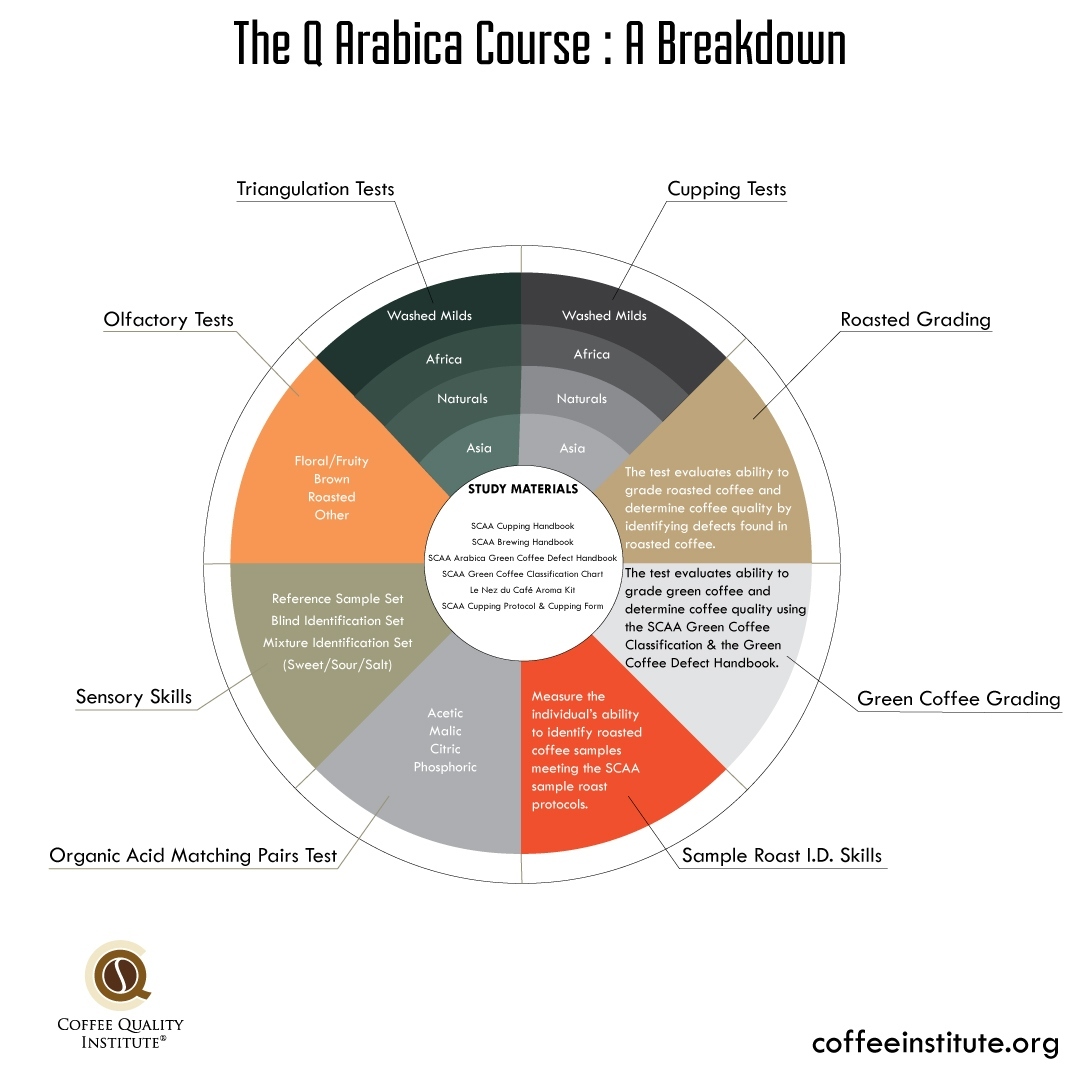Attempt #1 at becoming a Certified Q Arabica Grader!

The Q Arabica grader exam is one of the hardest exams I have ever had to do. It has also proved my greatest learning platform so far in the coffee industry.
Let me quickly try to explain as best I can what Q grading is all about and why this exam is so tough. The Q grader exam tests specialty coffee professionals on their knowledge and sensory skills to provide them with a Q Grader Certificate. The information as provided by the Coffee Quality Institute (CQI) online states that “a CGQ Q Arabica grader is a n individual who is credentialed by the CQI to grade and score coffees utilizing standards developed by the Specialty Coffee Association of America (SCAA).” The scoring of Arabica coffees “provides a common language for discussing coffee quality throughout the coffee chain from producers to buyers” and can be very impactful for the lives of farmers and producers of coffee. A cupping score over 80 points classifies a coffee as being specialty. Perhaps think of a Q Arabica Grader in specialty coffee as being similar to that of a sommelier - we taste (but not drink, noone can handle that much caffeine!) and we write and score whatever is happening in the cup.
{ http://www.coffeeinstitute.org/our-work/q-coffee-system/what-is-a-q-grader/ }
Tony and I made a last minute decision that I should try sit the test 2 weeks before it was due to run. I rocked up to the Five Senses training centre in Stanmore keen to meet my fellow students and trainers. It was a comforting sight to see a friendly face in the group, Will Scholl from Seven Miles Roasters. The class consisted of 10 students; 7 men, 3 women, and a few extra students who swung in and out for retakes (I’ll explain this later). We proved to be a greatly diverse group of industry professionals, but I do admit I felt slightly underqualified as the youngest student present. My experience began and ended with “I’m a barista” while everyone else seemed to have clocked up 2, 3, 4, 5 different job roles. Clearly, I had the ability to learn the most!
The Q grader course and exam takes a total of 6 days; 3 days of training and practice and then 3 days of exams. There are 8 parts to be passed each with different sections. 22 exams altogether. The diagram below, also taken from CQI website (see link above), outlines each of these sections for you.
Some exams take longer than others, each cupping spanning one hour to grasp the full spectrum of what’s in each coffee, while the roast grading takes all of 30 seconds to identify the ‘odd’ looking roasted beans in a 100g sample.
We all had different strengths and weaknesses. My weakness proved to be triangulations – finding the odd cup out of 3 in a blind tasting. Don’t be fooled by the simplistic instructions of the task – it’s tough! By way of example, imagine drinking three cups of sugared water all at the same ratios, but two of those cups were CSR white sugar and the third cup was home-brand white sugar. Could you tell the difference in a blind taste?
Conversely, I was stronger in olfactory skills (identifying smells) and roast identification.
Within a week I learnt so much more about my palate than I have in my 6 years as a barista. I learnt that I am not overly sensitive to sour but I am to salt. I am likely to pick up flavours such as jasmine, peach and apple more than flavours like apricot or smoke. I even had the dubious pleasure of tasting my first mouldy coffee!
I am once again grateful for the incredible people I met and the bonds we made over our mutual examination feelings. The apprehensive bonding when we recorded the same answers so we could all pass or fail together, the quick yoga vinyasa to recalibrate our tastebuds mid-exam session, and the increasing desire to dab our nose into our armpits to recalibrate our olfactory senses! We conversed over dry crackers and butter in between exams while our sandpaper tongues screamed out for the bolder flavours of chili, garlic, onion and pepper which were denied to them for the week.
This was not an exam I expected to pass first time. In fact, I would be concerned if I did. It is designed to be tough and gruelling on the tongue, on the mind, on the brain, and with the little experience I have in the coffee industry I have not had the exposure that should be necessary to pass this exam (that, by the way, does have a pass rate of about 25%!!!!!). The exciting thing about the future is that these skills can be learned. You don’t have to be born with an incredible tongue – you just need to open your mind and senses to a whole new world!
The Q grader exam allows students to retake sections they did not pass without needing to resit the entire course again – which is fantastic! In the end, I reached and even beat my goal to resit no more than four tests out of the 22, having to conquer only 2 pesky triangulations. Stay posted for when I do finally manage to land my Q!
Overcome your FOMO – subscribe to our e-mail list so you’re always up to date with news and info from the award-winning Coffee Brothers team. Don’t worry, I won’t overload you– I’m far too lazy for that!
Photo credits go out to our mates at the Five Senses lab who hosted the Q course this time. Thanks gents.

